The Engaged Liberal Arts

Olin Arts Center Concert Hall
October 26, 2012
9:30 a.m. to Noon
How does the world inspire ideas in the minds of great scholars? How do ideas in the hands of skilled practitioners play out in the world?
This cycle of conception, action, effect and perception is the topic of The Engaged Liberal Arts and its two panel discussions, The World of Ideas and Ideas in the World, with panel introductions by Thomas Tracy, Phillips Professor of Philosophy and Religious Studies.
Together, these two sessions offer our panelists an opportunity to explore the animating principle of the liberal arts — the capacity to explore ideas as a means of human fulfillment and as a force in the world.
The World of Ideas
9:30 to 10:30 a.m.
“The splendid achievements of the intellect, like the soul, are everlasting,” wrote the Roman historian Sallust. The scholar at work is curious and creative, eager to investigate, and determined to explain. What led our four scholars to the intellectual life? What have been their most compelling discoveries? What conditions are present and necessary when ideas are born? What are the marks of a good line of inquiry? And is it true that our scholars “know it when they see it?”
- Valerie Smith ’75, moderator: Dean of the college, Woodrow Wilson Professor of Literature, and professor of English and African American Studies, Princeton University; author of Toni Morrison: Writing the Moral Imagination
- William Carlezon ’86: Professor of psychiatry, Harvard University; director of the Behavioral Genetics Laboratory, McLean Hospital
- Drew Faust: President and Lincoln Professor of History, Harvard University; author of This Republic of Suffering: Death and the American Civil War
- Lillian Nayder: Professor and chair of English, Bates College; author of The Other Dickens: A Life of Catherine Hogarth
Ideas in the World
10:45 to 11:45 a.m.
Powerful and transformative in our world, the ideas of competition and collaboration play out in different ways in our panelists’ various fields. How do these twin concepts create synergy in a group or organization, and what happens when they clash? How is this tension managed? Must the end result of competition always be a zero-sum solution? And is collaboration the same as teamwork, or something else altogether?
- Darby Ray, moderator: Director of the Harward Center for Community Partnerships and the Donald W. and Ann M. Harward Professor of Civic Engagement, Bates College; author of Working
- Michael Bonney ’80, P’09, P’12, P’15: Chief executive officer, Cubist Pharmaceuticals Inc.
- Andrew Byrnes ’05: Olympic gold and silver medalist, men’s eight rowing, Canada
- Francesco Duina: Professor of sociology, Bates College; author of Winning: Reflections on an American Obsession
About Our Participants
Panel Introductions
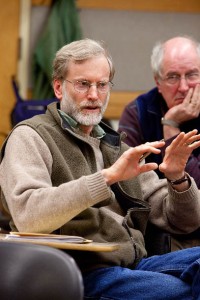
Thomas Tracy is the Phillips Professor of Philosophy and Religious Studies at Bates and an apt scholar for today’s introductions. In his teaching and research, Tracy offers theoretical insights into a range of vexing topics — medical and environmental ethics, the problem of evil in the context of God’s goodness and power, and the relation between classical issues in philosophical theology and contemporary developments in the natural sciences. A member of the International Society for Science and Religion and the Society for Philosophy of Religion, Tracy offers professional service to the advisory committee of Androscoggin Home Care & Hospice in Lewiston, and he was a founding and long-serving member of the ethics committee of Maine General Hospital. Among his many publications is the recent article “Evolutionary Theologies” in Theology and Science, addressing the central challenges that evolutionary theory poses for theology. Tracy serves as chair of the Division of Humanities at Bates.
The World of Ideas
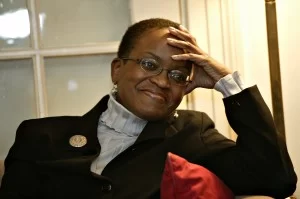
Valerie Smith ’75, moderator, leads the undergraduate academic program at Princeton University as dean of the college. From 2006 to 2010, Smith served as founding director of Princeton’s Center for African American Studies, carrying out the center’s mission — to spread the study and ideas of race issues throughout Princeton’s liberal arts education — by expanding the center’s curriculum and hiring faculty across the disciplines. As the Woodrow Wilson Professor of Literature and a professor of English and African American studies at Princeton, Smith specializes in African American literary and cultural studies. Speaking at Bates in 2004, Smith encouraged her audience to consider how literature and film challenge popular assumptions about historical processes and social movements. Her most recent book, Toni Morrison: Writing the Moral Imagination, embraces that idea by exploring how the author’s novels and non-fiction writing question conventional ideas about American cultural history. A member of the Bates College Board of Trustees, Smith earned a bachelor of arts in English at Bates and graduated Phi Beta Kappa. She holds a doctorate in English from the University of Virginia.
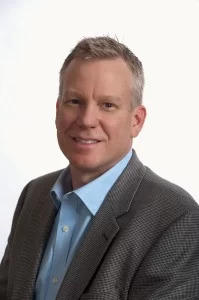
William Carlezon ’86 is a neuroscience researcher and professor of psychiatry at Harvard Medical School, where he brings his ideas to bear on one of the most elemental questions of human existence: “What’s your mood?” As director of the Behavioral Genetics Lab at McLean Hospital, Carlezon studies how genes affect behavior; how stress or exposure to drugs, whether illicit or prescribed, affects gene expression; and how various experiences affect the developing brain over the long term. Recognition for his research includes the Presidential Early Career Award for Scientists and Engineers, bestowed by President George W. Bush at the White House, and the Jacob P. Waletzky Award for Innovative Research in Drug Addiction and Alcoholism. He is editor-in-chief of the journal Neuropsychopharmacology. At Bates he earned a bachelor of science in biology and psychology, and he holds a doctorate in psychology from Concordia University. He was a postdoctoral associate in molecular biology at Yale University School of Medicine. A lefty, he still holds the Bates record for best winning percentage by a pitcher, with a 12–1 career record.
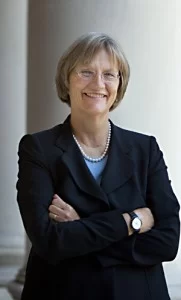
Drew Faust, president of Harvard University since 2007, said at her inauguration that a university “is not about results in the next quarter; it is not even about who a student has become by graduation. It is about learning that molds a lifetime, learning that transmits the heritage of millennia; learning that shapes the future.” Faust personifies this idea in myriad ways. The university’s Lincoln Professor of History in Harvard’s Faculty of Arts and Sciences, she recently saw her book This Republic of Suffering: Death and the American Civil War emerge as a film documentary by Ric Burns that was screened on PBS. As founding dean of the Radcliffe Institute for Advanced Study at Harvard in 2001, she guided its transformation into a scholarly institute, distinctive for the exploration of new knowledge at the crossroads of traditional fields. Indeed, Faust has said, the ideas that emerge from colleges and universities, and from the intersection of the humanities, the arts, and the social and natural sciences, “nurture the hopes of the world.”
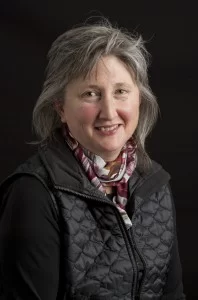
Lillian Nayder is professor and chair of English at Bates, and teaches courses on nineteenth-century British fiction. Her research focuses on the Victorians, their lives, and their writings. Her most recent book, The Other Dickens: A Life of Catherine Hogarth, reconstructs the story of the woman who married Charles Dickens, challenging misrepresentations of his wife that he put into circulation after their 1858 separation and that have defined Catherine ever since. Relegating Dickens to the margins of her narrative and drawing on a wide range of voices, particularly Catherine’s own, Nayder resists Dickens’s charisma and encourages readers and critics to do the same. In researching The Other Dickens, Nayder came upon archival materials and lesser-known family stories that have inspired her latest projects — a novel about Dickens’ sisters and sisters-in-law as well as a group biography about the writer and his three brothers, two of whom also separated from their wives in the 1850s and from whom Dickens was permanently estranged.
Ideas in the World
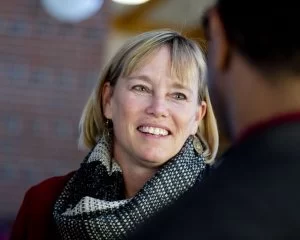
Darby Ray, moderator, is director of the Harward Center for Community Partnerships, the college’s program for community-based learning, volunteerism and environmental stewardship that involves more than 125 community organizations. Ray is also a religious studies scholar whose books and articles explore how theological concepts and practices relate to the realities of human and ecological suffering and to global forces such as work and the economy.
In her 2011 book Working, Ray examines the resources within Christian tradition for a model of work characterized by grace, cooperation, and equality, rather than exchange, competition, and predation. She came to Bates in 2012 from Millsaps College, where she was a professor of religion and a leader of community engagement. Ray received a doctorate in religion from Vanderbilt University and has taught courses in Christian thought, history of religions, and the meaning of work. Her other books include Incarnation and Imagination and Theology that Matters.
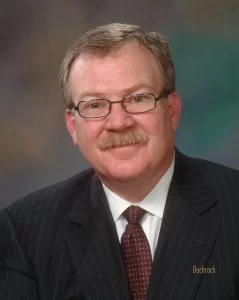
Michael Bonney ’80, P’09, P’12, P’15 is CEO of Cubist Pharmaceuticals Inc., a global leader in the research, development, and commercialization of products in the acute care/hospital environment, including antibiotics that fight resistant strains of bacteria. Named among the top five U.S. CEOs by MarketWatch, Bonney balances an intense focus on Cubist’s success with a savvy awareness that biotech and pharmaceutical companies may not always occupy the center of the drug-discovery ecosystem. Taking the long view of success, Bonney says that fresh ideas will increasingly come from academia, nonprofits, incubators, and even crowd-sourcing techniques that determine grant funding for entrepreneurs. “At Cubist, we are true believers in driving innovation, but agnostic about where it actually happens,” Bonney says. “Our focus will always be on delivering important therapies to acutely ill patients.” Bonney’s own career is distinctive for its embrace of nontraditional opportunities, including 12 years early in his career with U.K.-based Zeneca, where “every 18 months I had a different role. It gave me a broad perspective on the industry.” Bonney, who earned an economics degree at Bates, is chair of the Bates College Board of Trustees.
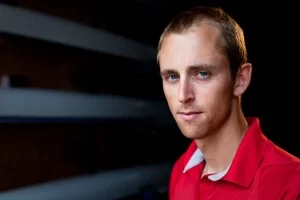
Andrew Byrnes ’05 won Olympic gold in 2008 and silver in 2012 as a rower on the Canadian men’s eight team. Compared with winning Olympic gold in Beijing, the team’s runner-up experience in London this year offers perhaps an even more powerful story of collaboration and competition. After a disastrous first race, the team had to regroup and overhaul its strategy in just a few days while under the unique pressure of representing a nation on the world stage. “What we did is a testament to this crew, the tenacity of these guys and the resilience of our coach, that we were able to pick up the pieces from what could have been a devastating experience,” Byrnes said afterward. He earned a bachelor of science in physics from Bates and was a New England Small College Athletic Conference All-Academic selection in 2005. In 2006, he earned a master of science in mechanical engineering from the University of Pennsylvania. Born in Toronto, Byrnes holds dual U.S.–Canadian citizenship.
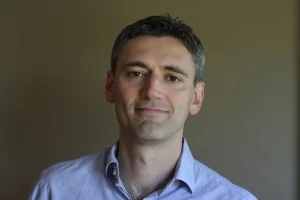
Francesco Duina is a professor of sociology at Bates and the author of four books, including Winning: Reflections on an American Obsession. Partly inspired by lively classroom discussions in his course “Sociology of Competition,” the book Winning explores, among other ideas, why the American passion for competition is not complemented by an equal level of general happiness. “We need to discover what we’re really after as we compete, and that takes some introspection,” Duina says. “There is much more behind our desire to win besides simply wanting victory or avoiding loss.” A visiting professor in the Department of Business and Politics at the Copenhagen Business School, Duina’s research and teaching interests include economic sociology, the nation-state, regional economic integration, and the sociology of culture. His other books are Institutions and the Economy, The Social Construction of Free Trade and Harmonizing Europe. A member of the editorial boards of the Journal of European Public Policy and Economy and Society and the author of a number of articles and book chapters, Duina earned a doctorate at Harvard University.